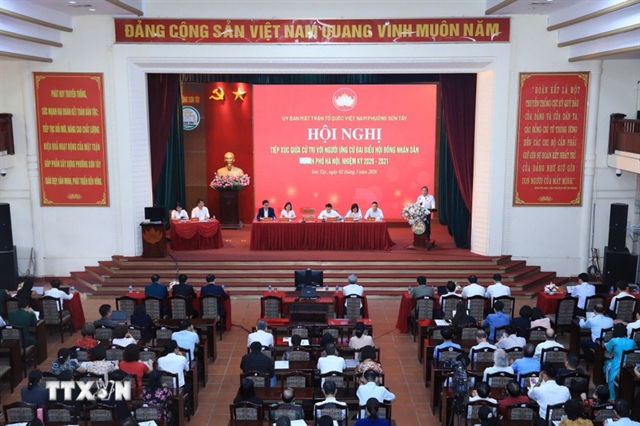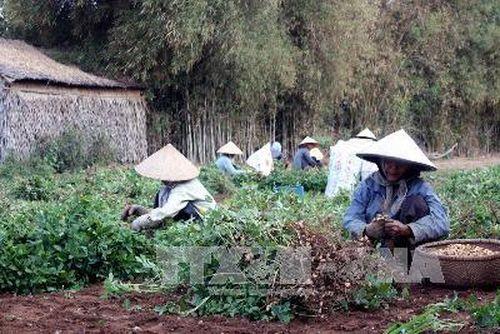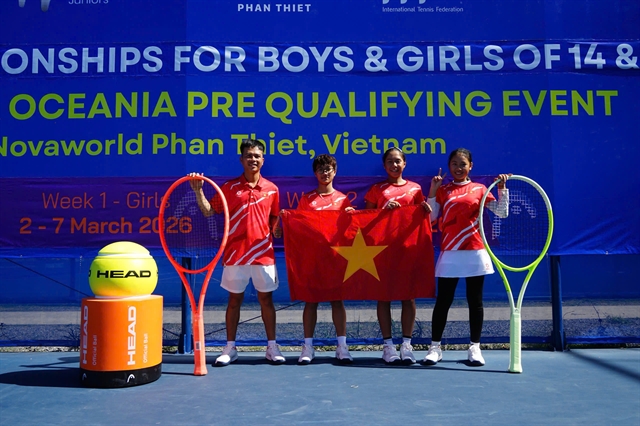 Society
Society


|
| Harvesting peanuts in Trà Vinh Province’s Cầu Ngang District. VNA/VNS Photo Huy Hoàng |
TRÀ VINH — The Cửu Long (Mekong) Delta province of Trà Vinh has encouraged more farmers to grow peanuts with organic fertiliser and less irrigation water to save labour costs and improve income.
The winter-spring 2016-17 crop planted by farmers of the Đồng Tâm Co-operative in Cầu Ngang District’s Long Sơn Commune had positive results.
Established in 2016, the group has 15 household members, including nine poor households and one near-poor household.
In the 2016-17 winter-spring crop, the co-operative members grew peanuts under the new model on a total area of 4ha.
They were supported by the Project for Adaptation to Climate Change in the Mekong Delta in Trà Vinh Province (AMD Trà Vinh).
The project paid for peanut seeds, fertiliser and automatic irrigation system, and helped them install automatic irrigation system and make organic fertiliser from agricultural by-products.
The cost of implementing the model was VNĐ457.3 million (US$19,800), including VNĐ207.6 million from the AMD Trà Vinh and VNĐ249.7 million from the members.
An automatic irrigation system includes a pump, water pipes and sprinklers. It costs about VNĐ30-35 million to install an automatic irrigation system on one hectare and can be used for five to seven years.
The model saves labour costs as it requires only one labourer to irrigate one hectare of peanuts, while traditional farming methods need four people.
Trần Văn Bảnh, head of the group, said peanuts planted under the model had a yield of 8-9 tonnes per hectare, up 1.5-2 times higher than traditional farming.
The members had a profit of VNĐ50 million ($2,160) per hectare a crop, two times higher than traditional farming.
Besides harvesting peanuts, the members also use peanut by-products to feed cows and improve income.
Trần Văn Nông, one of the members, said he also had 2,000sq.m of peanuts that were provided with financial support for installing automatic irrigation system.
He has invested automatic irrigation system for an additional 1,000sq.m of peanuts with his own money, he said.
With the success of the model, 70 households in Long Sơn Commune have applied the model for their peanut fields.
Huỳnh Quãng Sơn, deputy head of the province’s Agriculture Extension Centre’s Plant Cultivation Division, said agricultural production plays a crucial role in the province’s economy as the province has 180,000ha of arable land, accounting for 78 per cent of its total area.
Under the province’s policies of turning ineffective rice fields into growing areas for other crops to increase value and adapt to climate change, peanuts are suited to the province’s soil and weather, he said.
Farmers can use agricultural by-products to make organic fertiliser which improves yield and quality.
Trà Vinh has more than 17,00ha of coastal sand dunes, the largest in the delta. The coastal sand dunes normally face shortage of irrigation water in the dry season and are not suitable for rice cultivation.
Peanut vines are suited for growing in coastal sand dunes.
Phạm Minh Truyền, deputy director of the province’s Department of Agriculture and Rural Development, said that peanut cultivation has faced a shortage of quality peanuts for seeding.
The province can produce only 20 per cent of peanuts for seeding and has to buy 80 per cent from other provinces.
It also lacks companies that invest in processing peanuts, so farmers face difficulties in finding stable peanut outlets, he said.
The province’s People’s Committee has decided to spend more than VNĐ12 billion ($519,000) to improve the value chain for peanut in the 2018-20 period.
The province, one of the delta’s largest peanut producers, has 4,420ha of peanuts, including 3,400ha in Cầu Ngang District.
It has zoned a 500ha specialised farming area that will produce two crops of peanuts for seeding a year beginning next year.
It also plans to expand peanut cultivation area to 8,450ha with an annual output of 45,000 tonnes next year. VNS




